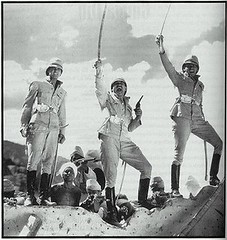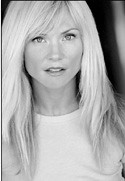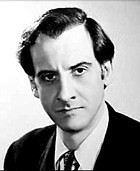GUNGA DIN
Your March 2008 RMC Results Are In!
Tagline: Barbaric Splendor - Gasping Magnitude - Adventure!
Preshow Entertainment: SNL - THE BEST OF JOHN BELUSHI
AND STEREOTYPICAL RACISM AT ITS BEST
PRESHOW ENTERTAINMENT:
In John Belushi's short and spectacular career, there are more "best of" clips than any three post-'83 cast members combined, with a Cheri Oteri on top. Seeing Belushi back to back as Jake Blues, The Bee singing "I'm a King Bee," "Samurai Delicatessen," Elizabeth Taylor self-Heimliching, and Marlon Brando as The Godfather in group therapy, you realize just how great he was (not to mention ahead of his time, right ANALYZE THIS 'n THAT?). And we only made it halfway through the tape. We didn't get to see his Joe Cocker, The Thing That Wouldn't Leave, "cheeseburger, cheeseburger," and the funny yet prophetic Schiller's Reel short where, as an old man, Belushi dances on the other SNL cast member graves.
AND NOW, OUR FEATURE PRESENTATION:
TERMS OF ENDEARMENT. THE BEST YEARS OF OUR LIVES. ORDINARY PEOPLE. THE TREASURE OF THE SIERRA MADRE. FROM HERE TO ETERNITY. THE WILD BUNCH. We're all guilty of having a list of "classic" movies that slipped through the cracks, remaining unseen. Those are a few of mine. But now I'm able to erase GUNGA DIN from that list.
The movie is fueled by the strong and playful relationships between three sergeants - Ballantine (Douglas Fairbanks, Jr.), MacChesney (Victor McLaglen), and the treasure hunt-lovin' Cutter (Cary Grant). These are our musketeers, clowning around while on dangerous missions in India.
When the telegraph lines in a nearby village are cut, the colonel sends The Three to investigate. They discover the village has been wiped out by a murderous cult, the truculant Thuggees (yes, that's how we got the word thug) who worship the goddess Kali, as the opening titles tell us with "based on historic fact."
Meanwhile, Ballantine's about to get married, so he's not reenlisting. So's not to break up the trio ("the two musketeers" just sounds wrong), Cutter and MacChesney plot to keep Ballantine in the service in a scene by a punch bowl that's near slapstick. Or maybe it's slapschtick.
While in the massacred village, Gunga Din, a native Indian who is an eager waterboy to the English troops, pleads with Cutter to let him be a soldier. He's learned all the salutes and commands and obeys them with enthusiasm. In one scene, he shows Cutter a bugle he had found, and contrary to regulations Cutter lets him keep it. Cutter likes Din. In fact, it's Din who tells him of a treasure, just miles away. And it's Din who helps Cutter escape from his cell (he was locked up for getting too drunk one night) to look for the treasure. And when he does find the treasure, he also discovers it's the sacrosanct home of the Thuggees. And Guru, the head Thuggee, wants to be found so he can ensnare and annihilate the entire British army who come to rescue them.
It's interesting how close this movie is to INDIANA JONES AND THE TEMPLE OF DOOM. I don't think it's a secret that Spielberg was paying an homage to GUNGA DIN. Or just stealing like a Thuggee steals a sacred stone.
Based on Rudyard Kipling's famous poem ("...you're a better man than I am, Gunga Din!"), and enlisting the services of no fewer than ten writers including William Faulkner and Ben Hecht, GUNGA DIN still holds up quite well...but not perfectly. The mix of serious adventure and jocular comedy feels fake, because if they're goofing around in battle then they probably won't get hurt, therefore there's no real sense of peril for our heroes. Case in point - playing a joke on your friend by pretending you're dead during a fierce gun battle.
Also somewhat jarring is actor Sam Jaffe, darkened to become Indian (You have a better tan than I do, Gunga Din). And when the sergeants three finally come face to face with Guru, he turns out to be a stereotypical movie cliche of an Asian bad guy. He reminded me of Ming in the Flash Gordon serials. Yet somehow the movie is frequently called racist, while the poem seems to remain a classic.
But who cares? There's an elephant named Annie!
Other things that don't work for me - the battle music sounded frivolous and even comedic, and sometimes they sped up the footage in the fight scenes, which only made it look unnatural and Keystone Kop-ish.
COOL NOTE: GUNGA DIN was one of the first of dozens of movies featuring stuntman Richard Farnsworth before he became a great character actor (THE GREY FOX, THE STRAIGHT STORY, THE NATURAL) five decades later.
We watched the two hour version of GUNGA DIN. There's another version, twenty minutes shorter, which cuts out mention of Kipling due to his estate's objection.
GUNGA DIN was released in 1939, the year commonly referred to as "the golden age of movies," and if you doubt that - THE WIZARD OF OZ, GONE WITH THE WIND, STAGECOACH, NINOTCHKA, MR. SMITH GOES TO WASHINGTON and others. Except for GONE WITH THE WIND, GUNGA DIN made more money than any of them. At a budget of nearly 2 million, this was RKO's most expensive film to date. Part of the reason was the tacking on of the ending battle featuring countless extras (RKO thought the original ending not big enough).
There's also a sequel, or maybe it's a remake, called SERGEANTS 3 set in the Wild West and starring...The Rat Pack! It's not on DVD or VHS, but I'll get my mitts on it one day.
Back in November 2004, I called BUTCH CASSIDY AND THE SUNDANCE KID a "trailblazer of the buddy movies". I was wrong, but in my defense I did add "you can all bust me on that, if you like." Well, permit me to bust myself - GUNGA DIN is a buddy/adventure comedy that came along 30 years before Butch and Sundance, and 45 years before Indy and Short Round ventured into the Temple of Doom.
Tags: random movie club, gunga din, cary grant, sam jaffe, douglas fairbanks jr., rudyard kipling, john belushi, snl















